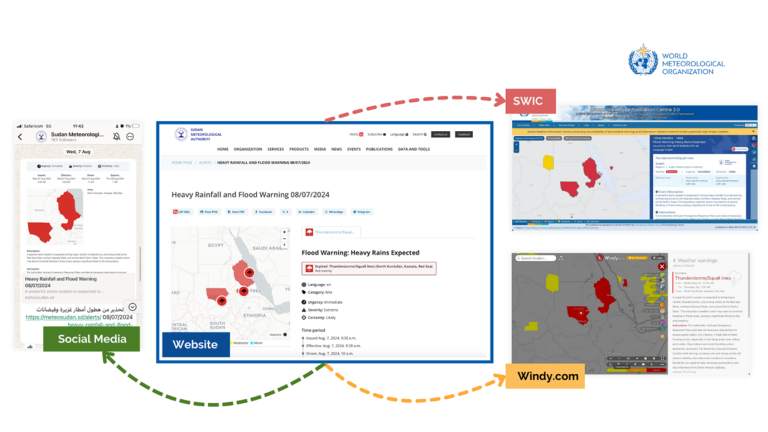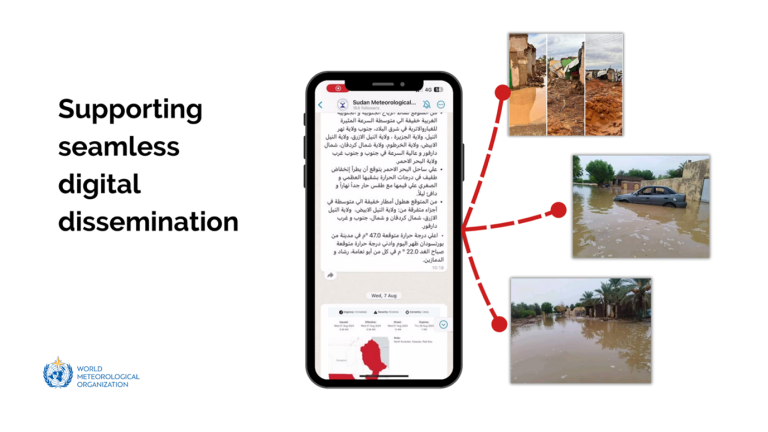Resilience and Innovation: Advancing Early Warnings in Sudan and South Sudan
Amidst immense challenges, both Sudan and South Sudan are making significant progress in strengthening their early warning systems, demonstrating resilience, innovation, and the power of digital transformation in weather and climate services.

Through the Common Alerting Protocol (CAP) and enhanced digital public infrastructure, Sudan and South Sudan are working to ensure that vital climate services and early warnings reach communities, even in the most difficult conditions.
South Sudan steps up Early Warnings as climate change intensifies heatwaves
In February 2025, South Sudan began transmitting meteorological data internationally for the first time in the country's history. This milestone, achieved through collaboration between the Food and Agriculture Organization of the United Nations (FAO), WMO, and South Sudan’s Meteorological Service, marks a significant step in integrating South Sudan into the global weather and climate data network.
The country also issued its first-ever heatwave warning in Common Alerting Protocol (CAP) format, marking a major step in its ability to alert the population to extreme weather. The heatwave had pushed temperatures beyond 40°C, leading to severe impacts across the country. Reports indicated that dozens of students had collapsed due to heat stroke, prompting authorities to close schools for two weeks to safeguard public health. As extreme heat events become more frequent due to climate change, timely and accessible warnings are critical for adaptation and resilience.
Sudan's remarkable resilience in Early Warnings during war
Since 15 April 2023, when the premises of the Sudan Meteorological Authority (SMA) became inaccessible due to the ongoing war, the staff—like millions of Sudanese citizens—have been displaced. Despite this, SMA personnel have maintained critical operations by working remotely from Port Sudan, Cairo, and Nairobi. This extraordinary resilience was made possible through the rapid deployment of cloud-hosted infrastructure, supported by WMO and the CREWS Initiative.
One remarkable milestone is the successful issuance of a flood warning during the crisis. Leveraging their new website, CAP Composer, and social media channels, SMA managed to alert the public to the danger of incoming floods. This life-saving message reached communities in time, proving that effective early warning systems can function—even from exile.


Digital innovation reshaping climate services
The progress in Sudan and South Sudan is part of a larger effort spearheaded by the WMO with support from NORCAP and the CREWS Initiative. Since 2022, this initiative has been driving the digital transformation of National Meteorological and Hydrological Services (NMHSs) across Africa to address critical gaps in technology adoption and capacity building. Key focus areas for improvement include:
- Enhanced Real-Time Data Collection and International Exchange: Strengthening data collection capabilities through automatic weather stations (AWS) and enabling seamless international data sharing through wis2box.
- Expanded Access to Global Forecasts and Satellite Data: Increasing accessibility to advanced forecasting models and satellite imagery to improve the accuracy and timeliness of weather predictions and climate monitoring.
- Development of User-Friendly Web-Based Services: Creating robust digital platforms and websites with enhanced product dissemination, intuitive warning systems, and interactive data visualization tools to better serve communities and stakeholders.
- Implementation of Common Alerting Protocol (CAP): Facilitating streamlined, standardized, and timely dissemination of warnings and alerts through CAP, integrated with national and global early warning systems.
- Cloud-Based Digital Infrastructure: Supporting sustainable and scalable digital transformation by transitioning to cloud hosting solutions to ensure reliability, accessibility, and efficiency.
- Capacity Building and Training: Delivering targeted training, mentoring, and capacity-building initiatives to empower NMHSs staff with technical expertise and best practices in climate services.
- Open-Source Software and Digital Public Goods: Leveraging and promoting open-source software solutions to enhance system interoperability, sustainability, and collaboration among NMHSs.
These improvements collectively strengthen climate resilience, early warning capabilities, and effective service delivery, contributing significantly to achieving Early Warnings for All and supporting sustainable development across the continent.









